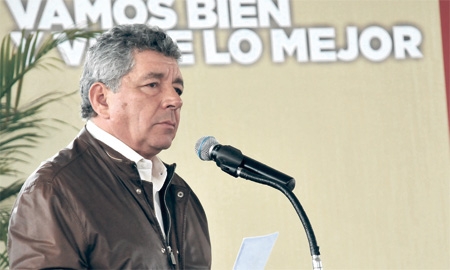Hugging the Gulf of Mexico for nearly 430 miles and flanked by the towering Sierra Madre mountains to the east, Veracruz is a long, thin, and irregularly shaped state that poses great challenges to government due to one of its most demographically distinct features: its highly dispersed population.
Ranked third most populous state in Mexico, more than 60% of Veracruz’s 7.2 million inhabitants are scattered around nearly 22,500 small rural communities, many of which have fewer than 500 inhabitants. Extending services to these remote areas has long been a cause of headache in government, and education – and its relevance to each diverse community – had been one of these services that suffered until the advent of Internet and other modern technologies.
Former President of Universidad Veracruzana and former Minister of Education for the State of Veracruz, Dr. Victor Arredondo advocates the use of new technologies to address old obstacles. Media such as the Internet, for example, can be used to train teachers without obliging them to travel far from their rural homes for on-site classes.
“The first challenge as Minister of Education was how to spread educational programs that could be consolidated among the state’s inhabitants in such a diverse territory and with such varied populations,” he says. “This is why work on educational quality, modern management in school processes, the relationship between schools and the ministry, and universal coverage in the case of basic through higher education required a good dose of technology and communication”.
In the state of Veracruz, as in the rest of Mexico, nearly three-quarters of the youth comprising the ages of 20 to 24 lack access to higher education. In contrast, in developed countries, this figure is much lower: 40%. Secondary school access is also limited, with approximately one-third of high-school aged students living too far from any schools. Veracruz does, however, have a more robust primary academic network: 2.3 million pupils study in the 22,500 schools in 7,100 towns.
In an effort to close this gap, Dr. Arredondo has converted Veracruz into the frontrunner in the deployment of avant-garde educational practices in Mexico. He has helped implement several projects that harness not only the Internet but also other audiovisual media to encourage the use of ICTs and new learning models in the classrooms, increase parental involvement, and train teachers. Indeed, Veracruz has the largest number of teachers trained via the Internet of any Mexican state – more than 30,000 in the last three years.
A new digital information system allows the Ministry to evaluate progress in the state’s overall educational system and each individual student, and then zero in on the areas that require remedial work and personalized support.
A doctor in educational psychology, Victor Arredondo is an ardent champion of education as a vehicle of economic empowerment and an enabler of human capital development at both the individual and collective levels.
“In our educational approach we work under the idea that each individual shapes his own destiny, and that group work within a community can give way to creating better conditions for individual and communal self-sustained development,” he explains.
He has based the approach and contents of the state programs on a triad of hypotheses that he believes can achieve positive results in little time, in any place and on any scale.
“The first hypothesis is that the planet cannot be fixed if local development is not encouraged,” says Dr. Arredondo, who postulates that the lack of schooling opportunities in rural communities can lead to more serious problems, such as demographic shifts away from the villages and into the cities, and as a consequence, family disintegration.
Lack of education, the inappropriate use of natural resources, the migration of the better skilled members of a community to big cities in search of better lifestyles, and the scarcity of opportunities often result in a major issue: once in the cities and faced with unemployment, young people turn to drugs and even a life of crime. Therefore, it is imperative that educational programs provide each individual with the tools that will allow him or her to become self-sufficient, to reach his or her full potential, and to successfully integrate into the community.
The second hypothesis has to do with the added value that technologies offer to farming communities and small enterprises: they are capable of helping raise productivity and teach management practices. “We’re emphasizing the importance of the tools new technologies afford that can raise the potential of individuals and companies,” adds Dr. Arredondo.
The third hypothesis, intrinsically linked to the first two, relates to the values of a society. Today, there are an estimated 5 to 7 million youth in the country that neither work nor study and are not active in any type of sport or cultural activity. “If the traditional values of Mexican families were still strong today, such as solidarity, respect, and community living, there wouldn’t be so much youth delinquency,” he asserts.
Dr. Arredondo has finished his term as Minister of Education but continues his work in distance education, teacher training, and new initiatives for effective learning and school management. As a true advocate of international collaboration and strategic alliances, he is committed to building up a network of operational partners in the Americas. “Sharing experiences and resources and aspiring to common ideals generate exponential synergies that allow accomplishing larger goals,” he remarks.

0 COMMENTS